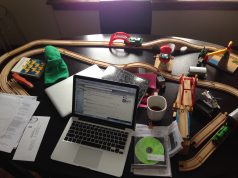This is the fourth in a series of articles capturing the planned conversations and discussions at the inaugural Festival of Live Digital Art (foldA), in Kingston ON, June 19-June 21, 2018. Stephen O’Connell writes about a conversation between Jillian Keiley and Brendan Healy that was presented in the Studio Theatre of the Isabel Bader Centre for the Performance Arts titled “Digital is Everywhere”.
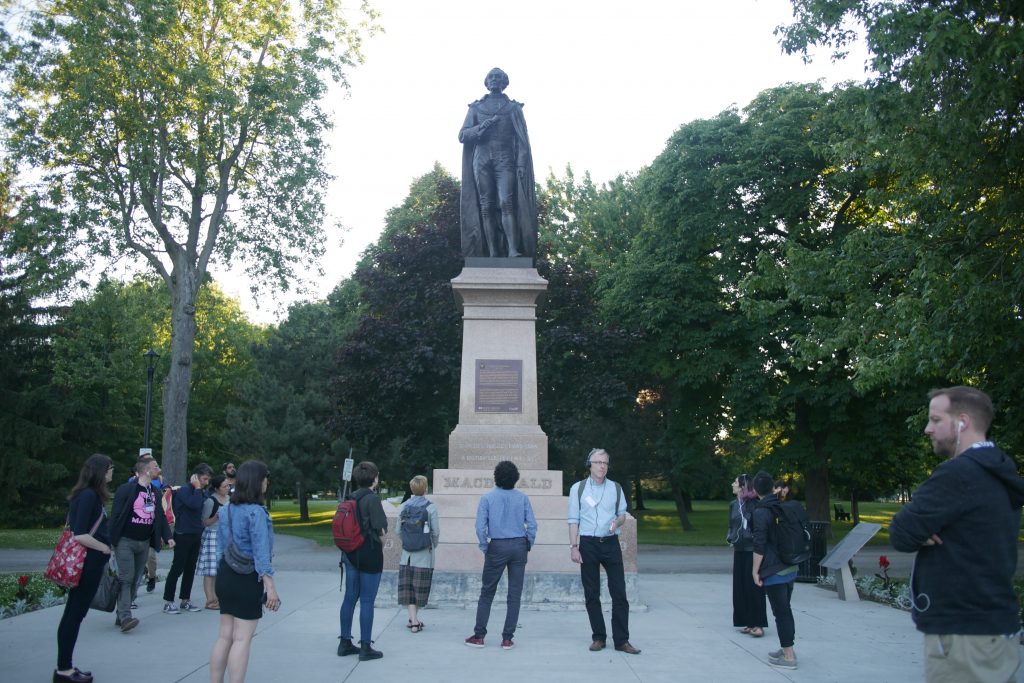
Our Friday morning Start Up Challenge, “Digital is Everywhere” is hosted by Jillian Keiley and Brendan Healy. I find this title particularly enticing because it sounds like a panicked exclamation from a 1973 post-apocalyptic science fiction noir film than a morning discussion about the future of theatre; “Digital is Everywhere”. I imagine it with a subtitle like “Soylent Green is made of people!”
The morning session is starting with a notable wave of fresh voices arriving from Toronto. The room is buzzing with excitement about Luminato and the premiere of Liza Balkan’s beautiful verbatim play “Out The Window”. At least half of the audience had either participated or attended the opening in Toronto last night and made the 3-hour trip to Kingston early this morning.
Brendan greets us as we file into the room and enter our names into a “Randomizer” app while we take our seats amongst the increasingly growing circle of digital advocates. Fear sets in when I suddenly realize he is going to call on us to participate at some point in the discussion. I haven’t had nearly enough coffee and I foolishly thought that anything to do with digital would have definitely insured my anonymity.
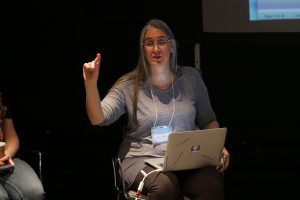
The conversation gets started with Jillian Keiley illustrating the benefits of Google Docs for any theatre director. She provides an example script full of written text, sound links, and visual images, as well as, designer and assistant director notes. Convincingly demonstrating the inclusive nature of digital documentation in a collaborative process. She goes on to explain the uses of TRELLO for casting and programming because it allows her greater objectivity without having to rely solely on memory.
Brendan Healy shared some fascinating insights and exciting news about his recent work in Brampton. A highly diverse city of 650,000 people and a population average age of 33. The city just completed a massive community consultation process. Looking ahead to 2040, the city leadership, along with significant input from the local community, aim to build a new vision of the City of Brampton.
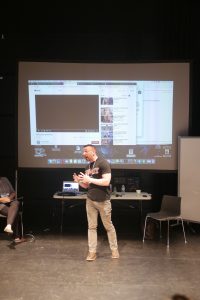
Now the fun gets started. Brendan and Jillian introduce the RANDOMIZER game. It involves 38 questions about digital technology posed to someone in the audience RANDOMLY selected by Jillian shaking her phone. Yes, there is an app for that! Brendan tries to reassure us with, “Those who don’t wish to participate can simply remain quiet and we will continue to the next question”. Okay perhaps not so reassuring, but we let the games begin.
Jillian gives her phone a hard shake and announces the first name. “Aislinn”. One of the morning’s fresh arrivals from Toronto.
QUESTION # 21: Have you ever used digital technology to instruct audience to participate?
Everyone implicitly lets out a nervous little laugh.
RESPONSE: “Why yes. Working with Michael Wheeler on the Section 98 piece. We enabled text messaging on phones that was posted live during the show.” She continues, “The responses to the piece ranged somewhere between, ‘This is really fascinating’” to ‘This is so boring”.
Jillian gives her phone another hard shake and announces another name. “Julie”. QUESTION #1: What is your reaction when you see screens in theatre?
RESPONSE: “I am completely open to what is seen and how you show it”.
Jillian gives her phone a final shake and announces “Adrienne”.
QUESTION # 5: How do you use digital for theatre creation?
RESPONSE: “It depends on the person I am working with. I communicate with Google Docs, organize meetings with ZOOM, track my activity with TRELLO and stay on time for the festival with the help of SLACK. I am interested in creating solutions for the largest number of people. For example, an apology generator with Simon Bloom and automated process with Dustin Harvey to rewrite and generate apologies. Did it make people feel better? I am interested in the body. Extending the body. Our bodies are expanding.”
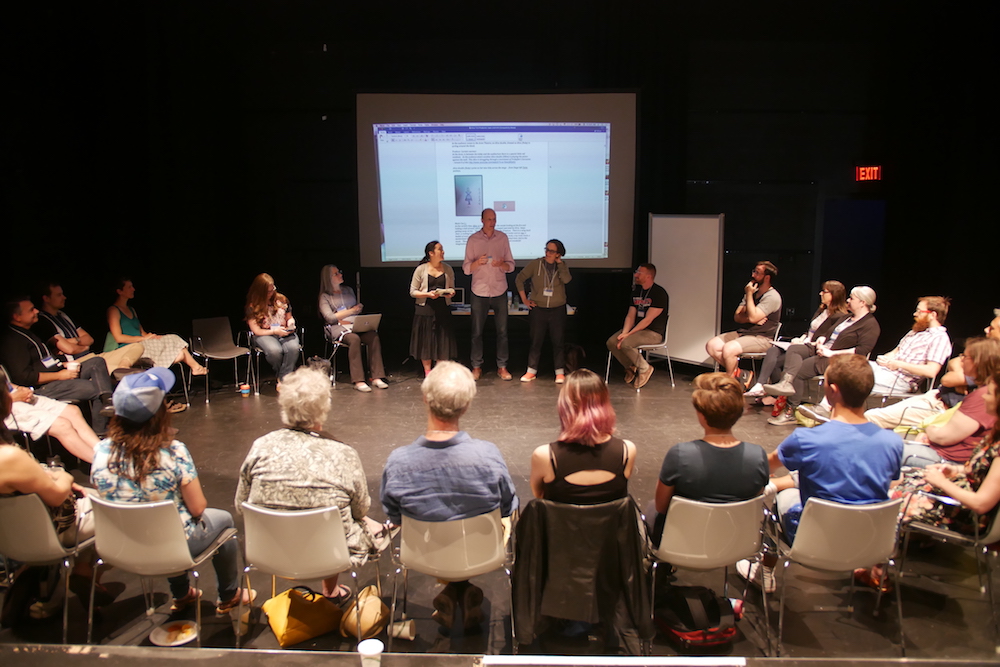
Interesting. A further expansion of the human body into digital space? Hum… I have ambivalent feelings about that. I am writing this essay on Google docs while rendering 360 video on Premiere Pro and listen to Spotify on my 5 year old Macbook Pro, when I would prefer to be running in the park. I distrust most of my devices; and I am deeply saddened by the feelings of alienation I experience standing on a subway platform surrounded by everyone checking their instagram and twitter feeds.
Yet I am currently collaborating on an iOS phone app for live performance. Why? Because I would agree with Adrienne. Our bodies have expanded. Technology is a tool not too dissimilar to a brush and canvas, that is only limited by the imagination of the individual who applies it. The future is quickly approaching and in the rear view mirror of time it is the early adapters that can and will make a meaningful impact on the future.
If you approach the conversation from a Darwinian perspective it makes reasonable sense that adaptation lends itself to evolution. I am suggesting that paint and brush, although not irrelevant, are highly romantic tools to be working with. The larger question is HOW will theatre navigate extinction in the age of mixed reality and artificial intelligence? The essence of good theatre is storytelling and a good story leaves one wanting to know what happens next. I for one want to know what’s next.








